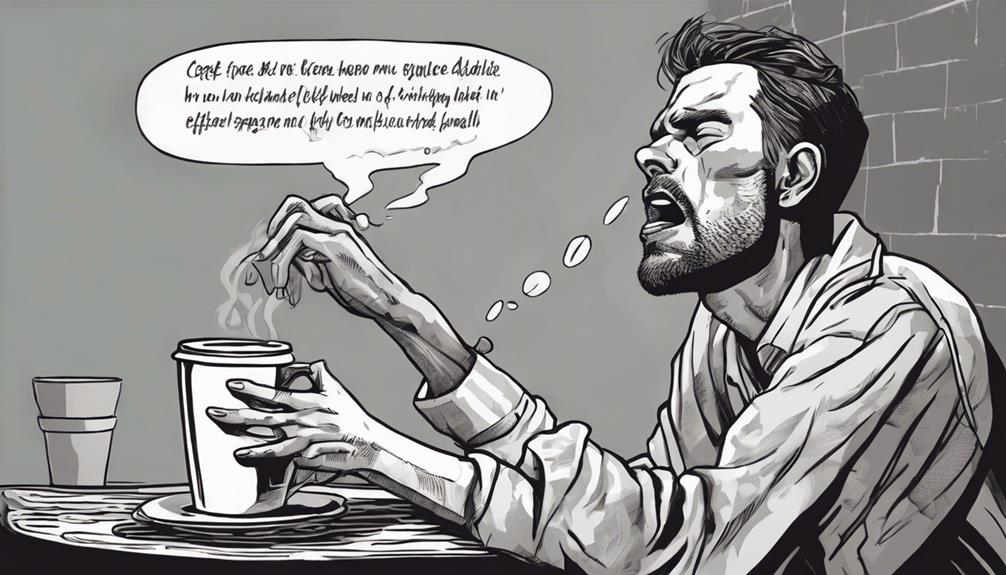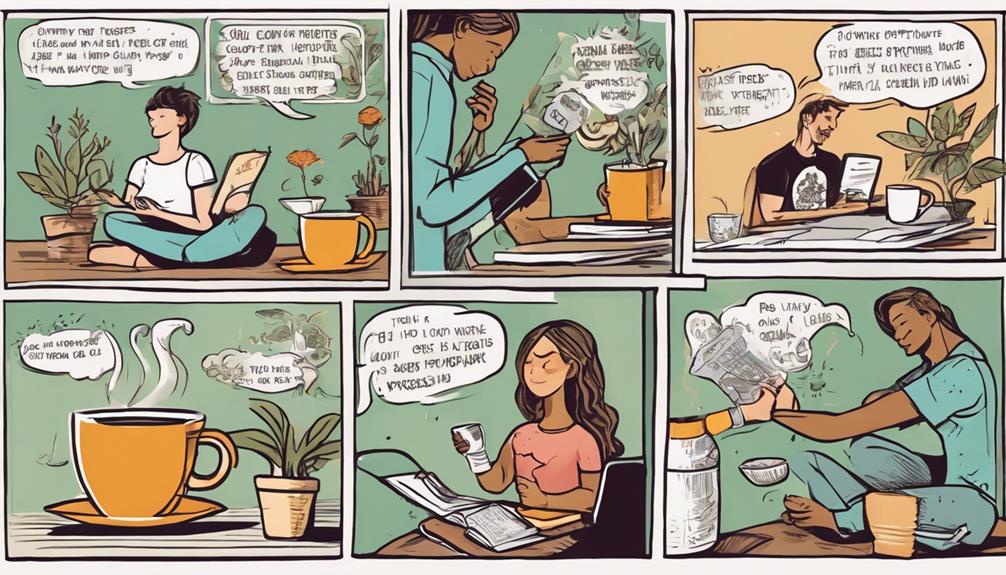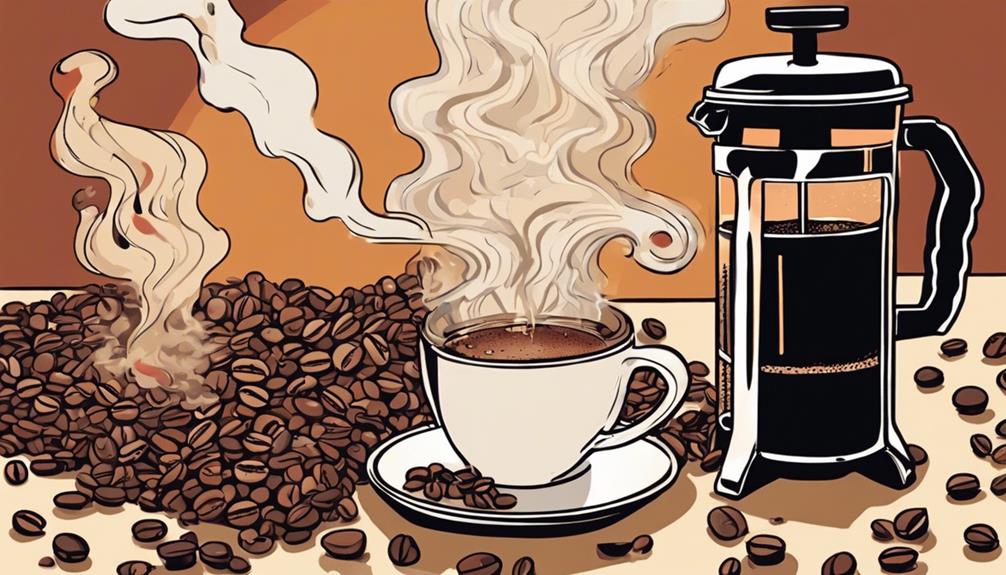Are you eager to break free from your coffee addiction? Be mindful of symptoms of dependence, such as headaches and irritability when you decrease consumption. Slowly decrease caffeine intake by 25-50mg every day. Replace coffee with herbal teas or decaffeinated options. Remember to stay hydrated and maintain balance to fight withdrawal symptoms. Exercise can also be beneficial! Don’t overlook the importance of support from friends or professionals. Explore caffeine-free alternatives for a healthier lifestyle. You can do this!
Key Takeaways
- Gradually reduce daily caffeine intake by 25-50mg.
- Swap regular coffee for herbal teas or decaf options.
- Stay hydrated and maintain balanced meals.
- Engage in regular exercise to reduce cravings.
- Seek support from friends or healthcare professionals.
Understanding Caffeine Addiction
To understand caffeine addiction, it's essential to recognize the signs of dependence on the stimulant properties of caffeine found in coffee and other beverages.
Caffeine addiction can sneak up on you, especially if your caffeine consumption exceeds recommended limits. Regular intake can lead to tolerance, where you need more caffeine to achieve the same effects, ultimately causing dependence.
When attempting to break the habit, you may experience withdrawal symptoms such as headaches, fatigue, irritability, and difficulty concentrating. These symptoms can be tough to deal with, but gradually reducing your caffeine intake can help minimize the severity of these symptoms and cravings.
It's important to understand that breaking a coffee addiction is a process that requires patience and determination. Understanding the effects of caffeine withdrawal and implementing strategies to address them can be helpful in this process. Additionally, finding alternative beverages or activities to replace the routine of drinking coffee can aid in breaking the addiction. If you find yourself struggling, consider seeking support from friends, family, or professional resources on how to block someone to feel more confident in your decision to break the addiction.
Recognizing Withdrawal Symptoms

Recognize the signs of caffeine withdrawal by being mindful of symptoms like headaches, fatigue, irritability, and difficulty concentrating. When you start reducing your caffeine intake, withdrawal symptoms typically kick in within 12-24 hours. These symptoms can peak between 24-48 hours and persist for 2-9 days, varying depending on your individual caffeine habits. To minimize these effects, consider tapering your caffeine consumption gradually. Additionally, staying hydrated, ensuring you get enough rest, and incorporating light exercise into your routine can support your body during this adjustment period.
| Caffeine Withdrawal Symptoms | Onset Time | Duration | Mitigation Strategies |
|---|---|---|---|
| Headaches | 12-24 hours | 2-9 days | Gradually taper caffeine intake |
| Fatigue | 12-24 hours | 2-9 days | Stay hydrated and rest adequately |
| Irritability | 12-24 hours | 2-9 days | Engage in light exercise |
| Difficulty Concentrating | 12-24 hours | 2-9 days | Practice mindfulness and relaxation techniques |
Effective Strategies for Quitting

How can you effectively quit a coffee addiction and minimize withdrawal symptoms?
To start, gradually reduce your daily caffeine intake by 25-50mg to ease the shift and lessen withdrawal symptoms. Consider swapping out your regular coffee for herbal teas or decaf options to cut down on overall caffeine consumption.
It's vital to stay hydrated with water and maintain balanced meals to combat fatigue during the withdrawal period.
Boost your energy levels by engaging in regular exercise, which can also help reduce cravings for caffeine.
Additionally, seek support from friends, family, or a healthcare professional to hold yourself accountable and stay motivated throughout the quitting process.
Healthy Alternatives to Coffee

Explore various caffeine-free and nutritious alternatives to coffee that can still satisfy your cravings and provide a flavorful experience. When looking to break your coffee addiction, consider trying herbal teas, decaffeinated coffee, mushroom coffee, and other natural energy-boosting options. Here are some healthy substitutes for coffee:
| Caffeine-Free Replacements | Description | Benefits |
|---|---|---|
| Herbal Teas | Chamomile, peppermint | Calming, soothing, and aromatic |
| Decaffeinated Coffee | Regular coffee taste without the caffeine kick | Helps reduce caffeine intake |
| Mushroom Coffee | Infused with medicinal mushrooms for added benefits | Enhances focus and energy levels |
| Natural Energy Boost | Adaptogenic herbs like ashwagandha or rhodiola | Promotes stress relief and vitality |
These substitutes not only provide a break from the caffeine cycle but also offer a variety of flavors and potential health benefits. Experiment with different options to find what suits your taste buds and lifestyle while still enjoying a satisfying beverage.
Managing Caffeine Intake

To effectively manage your caffeine intake, begin by tracking and evaluating your daily consumption from various sources to understand the extent of your reliance on this stimulant. Different beverages and foods contain varying amounts of caffeine, so it's essential to be aware of what you're consuming.
Increasing your awareness of how caffeine affects your daily activities can help you recognize the need to gradually reduce your intake to break the caffeine habit.
As you work on reducing your dependence on caffeine, staying hydrated with water can help combat withdrawal symptoms and decrease your reliance on caffeine for energy. Additionally, integrating decaffeinated options slowly into your routine can lower your overall caffeine consumption.
Exploring caffeine-free alternatives like herbal teas or sugar-free seltzer can also be beneficial in replacing caffeinated beverages and reducing your stimulant intake. By taking these steps, you can successfully manage your caffeine intake and work towards breaking your addiction to this stimulant.
Long-Term Benefits of Going Caffeine-Free

When you go caffeine-free, you can expect to experience improvements in your overall health post-quitting.
Your energy levels will stabilize, and you may notice enhanced quality of sleep.
These long-term benefits can positively impact your well-being and daily functioning.
Health Improvements After Quitting
Upon breaking your coffee addiction, you can experience a range of long-term health improvements, including better sleep quality and reduced risk of insomnia. Eliminating caffeine from your routine can also lead to better hydration levels, promoting overall improved skin health. Stabilizing blood sugar levels and reducing the risk of energy crashes throughout the day are additional benefits of going caffeine-free. Moreover, quitting coffee addiction can result in a decrease in anxiety and jitters, fostering a calmer state of mind. Long-term health improvements after quitting caffeine may extend to reducing the risk of heart palpitations and improving cardiovascular health.
| Health Improvements | After Quitting Caffeine |
|---|---|
| Improved Sleep Quality | Better Hydration Levels |
| Reduced Risk of Insomnia | Stabilized Blood Sugar Levels |
| Decreased Anxiety and Jitters | Improved Cardiovascular Health |
Energy Level Stabilization
Breaking your coffee addiction can result in long-term benefits such as more stable energy levels throughout the day, reducing the highs and crashes associated with caffeine consumption. By eliminating caffeine from your routine, you allow your body to naturally regulate its energy levels, leading to a consistent and steady supply of energy.
Without the spikes and subsequent crashes caused by caffeine, you can experience sustained energy levels that support your daily activities without the need for artificial stimulants.
Long-term effects of caffeine consumption can include dependency on stimulants to function, but by breaking a coffee addiction and going caffeine-free, you can achieve more sustainable energy levels. This shift away from relying on external sources of energy can enhance your focus, concentration, and productivity, allowing you to maintain high performance throughout the day.
Embracing a caffeine-free lifestyle can lead to improved overall well-being and a more balanced energy experience.
Sleep Quality Enhancement
Shifting to a caffeine-free lifestyle can lead to significant improvements in your sleep quality over time. By going caffeine-free, you may experience reduced nighttime awakenings and an increase in overall sleep duration.
Caffeine-free individuals often enjoy deeper and more restorative sleep, which can enhance cognitive function and mood. Long-term abstinence from caffeine has been associated with a decreased risk of developing sleep disorders like insomnia or restless leg syndrome.
Eliminating caffeine from your routine helps regulate your body's natural sleep-wake cycle, fostering a more consistent and invigorating sleep pattern. Without caffeine, you're more likely to experience a reduction in sleep disturbances and a higher chance of achieving restful, uninterrupted sleep.
Embracing a caffeine-free lifestyle not only benefits your energy levels but also contributes to enhancing the quality of your sleep, ultimately promoting overall well-being.
Frequently Asked Questions
Can I Still Enjoy Social Outings Without Drinking Coffee?
Yes, you can still enjoy social outings without drinking coffee. Opt for decaf or other non-caffeinated beverages. Focus on the company and conversations rather than the drink. Your enjoyment isn't linked solely to coffee.
How Can I Combat Fatigue During the Caffeine Withdrawal Process?
Feeling fatigued during caffeine withdrawal? You can combat fatigue by staying hydrated, eating nutritious foods, getting regular exercise, and ensuring you're getting enough sleep. These simple steps will help you navigate through the withdrawal process.
Are There Any Herbal Teas That Can Help Ease Coffee Cravings?
To ease coffee cravings, try herbal teas like chamomile, peppermint, or ginger. These can provide a soothing alternative while supporting your shift away from coffee. Experiment with different flavors to find what works best for you.
What Are Some Practical Ways to Reduce Caffeine Intake Gradually?
To reduce caffeine intake gradually, start by swapping some of your usual coffee with decaf. Gradually increase the ratio of decaf to regular coffee. This method can help you cut back on caffeine without drastic changes.
Will Quitting Coffee Improve My Sleep Quality in the Long Run?
Quitting coffee can improve your sleep quality in the long run by reducing caffeine's stimulating effects. Over time, your body will adjust to a more natural sleep cycle, leading to deeper, more restful sleep.
Conclusion
You've learned about the grip caffeine addiction can have on your daily routine. By recognizing withdrawal symptoms and implementing effective strategies, you can break free from your coffee habit for good.
Remember, there are healthy alternatives to coffee and managing your caffeine intake is key. The long-term benefits of going caffeine-free include improved sleep, less anxiety, and overall better health.
Take control of your addiction and start enjoying a life free from caffeine dependence.









